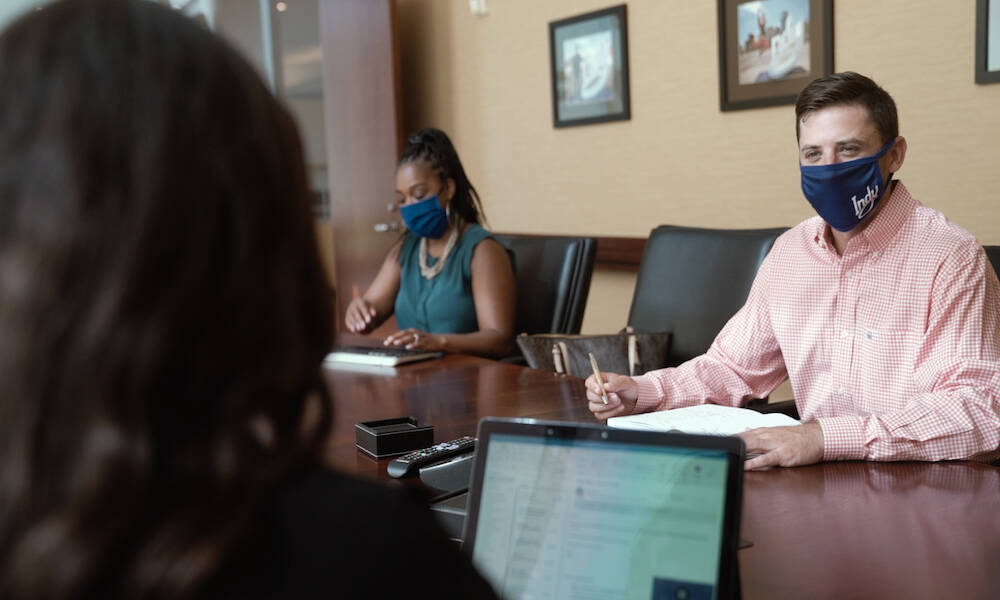
3 Ways Associations Can Make Decisions Fast in a Crisis
In the pandemic, every moment matters—and Indy is making moves.
It might be human nature to freeze in the face of crisis. But the only way for businesses to navigate through sudden upheaval is with speed and agility. Quick, data-driven decision making must lead the way for all aspects of associations—from meeting planners grappling with the transition to a virtual event, to membership teams struggling to keep members engaged.
Consider what’s known as the SODA loop. The acronym stands for scan (the circumstances), orient (to the changes), decide (on an effective response), and act fast to implement it. In crises, businesses that successfully tighten that loop will come out on top when the dust settles. Here are some tips for how to make it happen.
Organize a committee of experts.
When the pandemic began impacting events in March, the Indy Convention Center evaluated the situation and moved swiftly to adapt. It changed air filtration systems and sanitization protocols, revamped the floor plan for greater capacity, and invested more than $7 million in overall improvements.
“Indy was built to host major events. It’s what we do,” explains Roberta Tisdul, the director of convention services for Visit Indy. “After years of hosting Final Fours, large-scale conventions, and a Super Bowl, we have perfected the local organizing committee concept. By including leaders representing the full spectrum of the hospitality industry, we are able to form a united front.”
Adapting that organizing committee model, the team created the Indy Tourism Recovery Task Force, which provided a platform to orchestrate unified city-wide safety and hospitality guidelines.
Build and adapt infrastructure.
The ability to react swiftly in changing times is easier when a business already has some infrastructure in place to prepare for eventualities. But crisis can also be an opportunity to build upon or even set up new infrastructures that guide the business into a changed future.
Indy found itself well prepared when circumstances called to pivot to new space restrictions mandated by the city as well as an increase of hybrid and virtual meeting requests. First, the city had the space: The Indiana Convention Center and Lucas Oil Stadium, connected by an enclosed skywalk, combine for nearly 750,000 square feet of exhibit space, more than 80 breakout rooms, and three ballrooms. But the Indiana Convention Center also worked quickly to revise floor plans with built-in six-foot physical distancing measures. These new protocols allowed Indy to host more than 40,000 attendees across 18 events amid eased restrictions in August.
“Each of these meeting groups proactively worked with Visit Indy, the Indiana Convention Center, hotels, and the Marion County Health Department to have their health and safety plan approved,” Tisdul explains. “That’s the team mentality here in Indy.”
For hybrid meetings, and the need to connect virtual attendees with the destination, Indy has developed video content that can be customized for breaks—from zen time lapses to mixologist recipes to virtual workouts.
Internet bandwidth has also become essential to hosting large-scale streaming events. And the Indiana Convention Center and Lucas Oil Stadium offers 21 gigabits per second of bandwidth, more than 2,000 Wi-Fi access points between both venues, and free Wi-Fi available in public areas.
Communicate and collaborate.
A strong team can harness its effective collaboration and communication strategies to weather a crisis from a unified position.
“We’ve always known the hospitality community in Indy is one team, yet this pandemic solidified it,” Tisdul says. “From hotels, to A/V companies, to the city—we’re all working to find solutions to the evolving challenges. Indy was one of the first cities to resume hosting large meetings, and to do that safely required a vast amount of collaboration.”
But the midst of an emergency is not an ideal time to put that team framework into place; rather, teamwork should be a goal organizations strive to build every day.
“Quick decision-making is really indicative of the people and processes you have in place even before a crisis strikes,” Tisdul says. “Combine a productive, positive, and progressive attitude with a proven track record in hosting large events and you have a team that is ready to weather this storm and come out stronger than ever.”
Visit Indy proudly serves as the official sales and marketing organization for USA Today’s “#1 Convention City in the U.S.” Learn more at VisitIndy.com.





